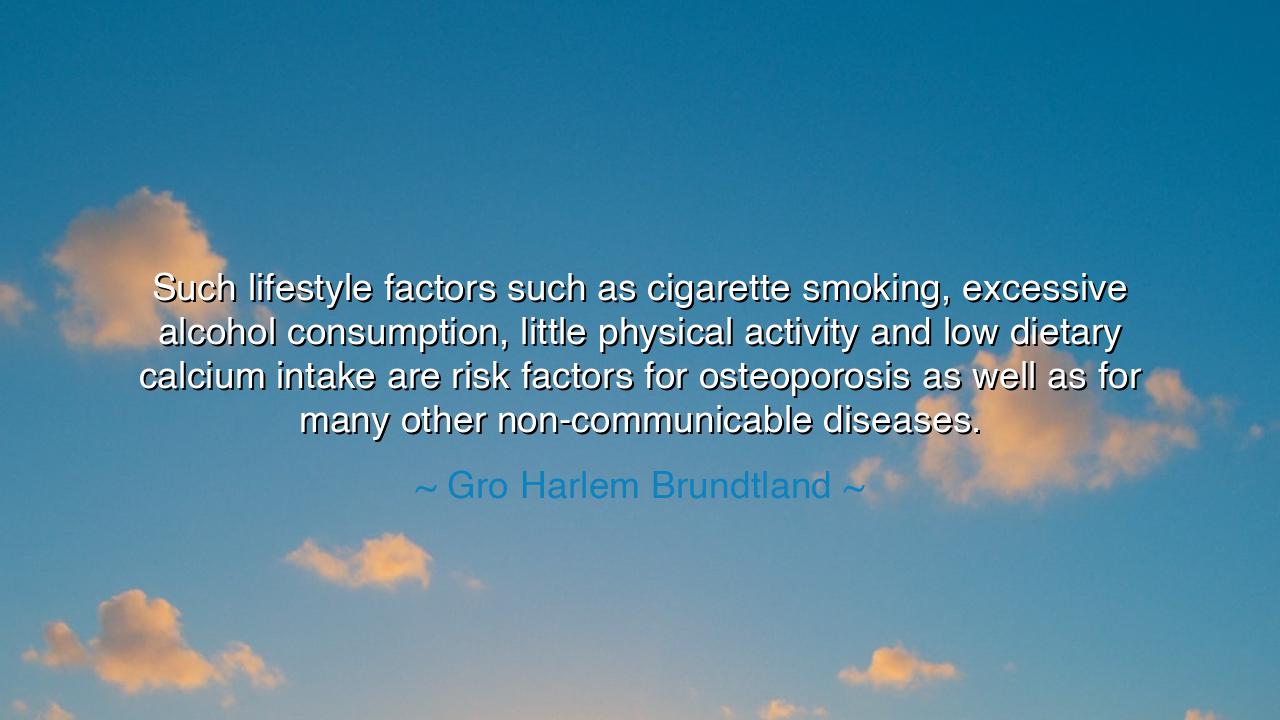
Such lifestyle factors such as cigarette smoking, excessive
Such lifestyle factors such as cigarette smoking, excessive alcohol consumption, little physical activity and low dietary calcium intake are risk factors for osteoporosis as well as for many other non-communicable diseases.






In the words of Gro Harlem Brundtland, “Such lifestyle factors such as cigarette smoking, excessive alcohol consumption, little physical activity and low dietary calcium intake are risk factors for osteoporosis as well as for many other non-communicable diseases,” we hear the voice of both a physician and a philosopher, one who sees health not as chance, but as choice. Her words rise not merely from science, but from the timeless wisdom that the body is the servant of habit, and that the life we live shapes the vessel that carries us through time. She speaks not as one warning of doom, but as one calling for awareness — for in her words lies a truth known since the dawn of civilization: that the path to wellness and longevity is paved not by fortune, but by the daily actions of one’s own hand.
To say that “lifestyle factors” such as smoking, drinking, idleness, and poor nourishment lead to disease is to restate an ancient law of nature — the law of cause and effect. The ancients, too, understood this balance between behavior and consequence. The philosopher Hippocrates, father of medicine, declared, “If we could give every individual the right amount of nourishment and exercise, not too little and not too much, we would have found the safest way to health.” Brundtland’s words are an echo of this ancient principle, reminding modern humanity that disease is rarely born in a single moment; it is forged slowly, from the choices we repeat, the indulgences we excuse, and the wisdom we neglect.
Her mention of cigarette smoking and excessive alcohol is a warning against self-inflicted wounds — habits that seduce the spirit while corroding the flesh. The ancients might have likened them to the sirens of Odysseus, whose songs promised pleasure but led to ruin. For in every age, mankind has faced the temptation to trade tomorrow’s strength for today’s comfort. Tobacco and drink, once symbols of leisure and power, have proven themselves to be thieves of vitality, robbing not only the lungs and liver, but the will to live wisely. To surrender to such habits is to wage war against the body’s natural harmony — to poison the temple in which the spirit dwells.
Low physical activity, too, is a modern affliction the ancients would scarcely recognize. In their time, life itself was movement — the hunter, the farmer, the soldier, the builder all knew that the body thrives through labor. They saw motion as honor, stillness as decay. The philosopher Epictetus taught that to strengthen the mind, one must also strengthen the body, for they are intertwined as flame and fuel. Brundtland’s call for activity is thus not mere exercise, but a return to the natural rhythm of life, to the truth that the human form was never meant for idleness. When the body lies dormant, the spirit follows, and the fire of life burns dim.
Her warning about low dietary calcium intake reaches deeper than the nourishment of the bones — it speaks to the soul’s relationship with discipline and care. In every culture, food has been sacred, a gift of the earth meant to sustain both strength and gratitude. The neglect of nourishment is not merely physical neglect; it is forgetfulness — a failure to honor the life one has been given. The bones, which hold us upright, symbolize not only structure but integrity. To weaken them through poor nourishment is to forget the foundations of health itself. The wise have always known that eating well is not indulgence, but reverence for the self, for what we consume becomes what we are.
Brundtland also speaks of osteoporosis and non-communicable diseases, yet her message transcends any single ailment. These are the silent consequences of imbalance — diseases that grow not from contagion, but from neglect. They are the illnesses of modern prosperity, born of abundance without mindfulness, of freedom without restraint. The ancient physicians warned that when man separates himself from nature’s rhythm, he invites decay. The same holds true now. The one who forgets to move, to breathe cleanly, to eat simply, and to live with moderation, will one day find his own body turned against him — not by cruelty, but by natural law.
Let this, then, be the lesson passed down: honor your body as you would honor the gods themselves. Do not wound it with smoke or drown it in drink. Feed it with the bounty of the earth — with fruits, grains, and minerals that strengthen bone and spirit alike. Move daily, for motion is the prayer of the living. Let moderation be your guide and awareness your shield. For no medicine can undo what decades of neglect create, and no doctor can save the one who will not save himself.
Thus, the wisdom of Gro Harlem Brundtland stands as both warning and hope. It calls not merely for health, but for responsibility, for the courage to live as caretakers of our own fate. The ancients would have called it virtue — to live in alignment with the laws of nature and the limits of one’s body. If humanity learns again to honor this sacred balance — between pleasure and restraint, rest and effort, indulgence and care — then disease will no longer be the harvest of neglect, but the rare misfortune of life’s chance. For in truth, the power to preserve health lies not in the hands of destiny, but in the choices we make each day we are blessed to draw breath.






AAdministratorAdministrator
Welcome, honored guests. Please leave a comment, we will respond soon